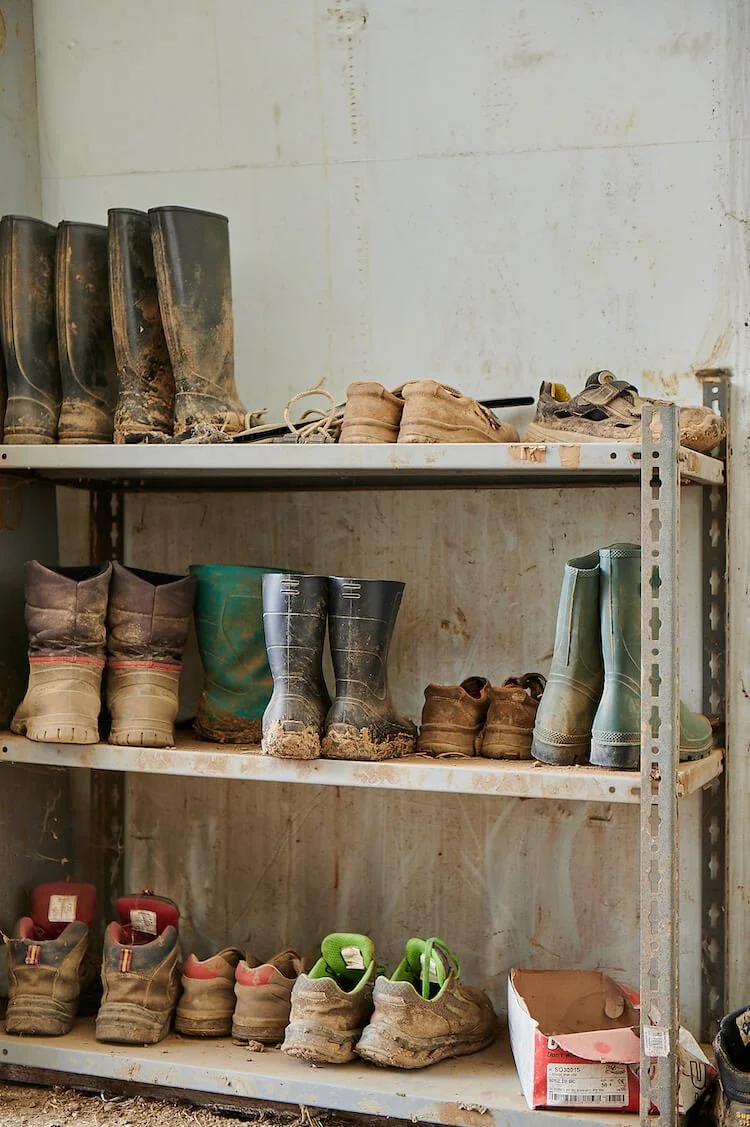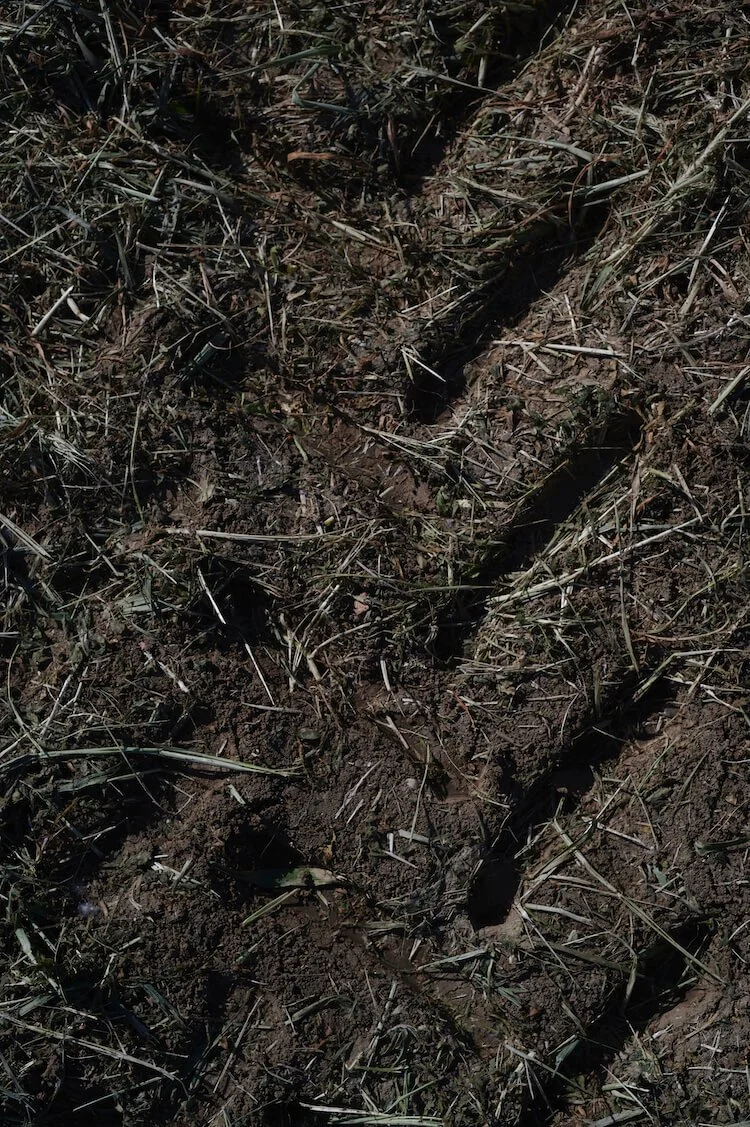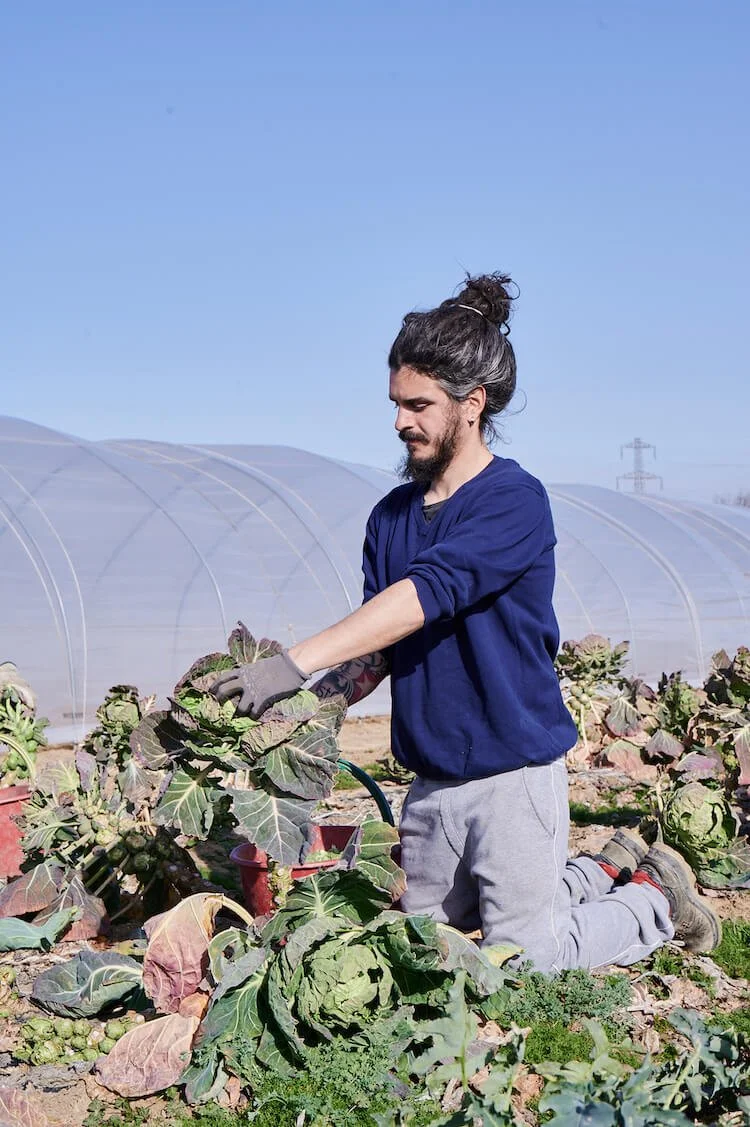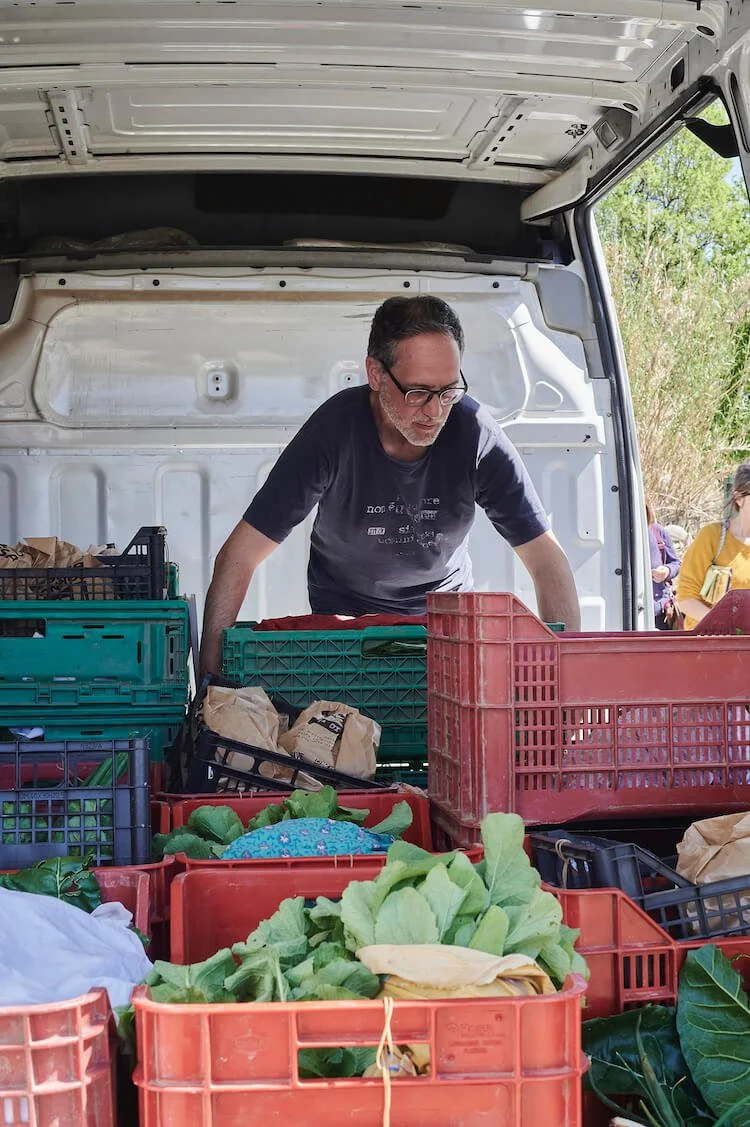Bologna, Italy
SEEDS OF COMMUNITY
The bond with Bologna, my hometown has, if possible, become even stronger since I discovered Arvaia. The people of this vegetable and fruit garden welcomed me a year ago, allowing me to photograph and document its life during the four seasons. Arvaia can be considered the garden of about 300 families who have chosen to be actors of their own nourishment and give a new meaning to food.
In Bolognese dialect “Arvaia” means pea, where various seeds are joined together inside the same pod. Lorenzo, farmer at Arvaia for 7 years now, says his choice to get involved was born out of a search for an alternative model to large-scale distribution. For him, CSA is a system that allows wealth to circulate in the area where he lives instead of giving his money to potentates or multinationals that do not care about the essentials of human and natural environments. Like him, over 300 members are now contributing to the existence of the first Italian CSA.
“Italians like to share, and to do so in the spirit of moms and grandmas of the twentieth-century mold: offering generous portions and not wasting any part of the plants.”
— Lorenzo
In Italy, the solidarity purchasing groups (gruppi d’acquisto solidale - GAS) can be considered the forerunners of CSAs. The GAS were born 30 years ago, precisely in the same region (Emilia Romagna), with the ambition that one could change the world by grocery shopping. This was a grass roots revolution, thanks to the will of thousands of people who decided to network and consciously consume in order to build a better future for the planet. This concept of solidarity guides the choice of products and their producers, whose methods are based on ethical and ecological principles and because they are locally based allow people to meet each other and reduce the pollution and energy waste resulting from the transportation of goods.
In addition to the countless benefits related to justice and food security, these models have the merit of sharply countering a number of important problems that characterize our country, such as agromafie, agri-food crimes, whose turnover would be around 25 billion euros according to the Observatory on Crime in Agriculture, or caporalato, the exploitation of workers, often migrants of foreign origin, of which today there are more than 450,000 in Italy. In a country widely known for its gastronomy, mafias do golden business in the agribusiness sector, and the link between organized crime and the agricultural world is ancient, dating back to the second half of the 19th century. In fact, this sprawling, cross-cutting system starts in the fields and extends to distribution inside and outside national borders.
Perhaps not everyone is yet aware that one's food choices can influence and be intertwined with a series of crimes including the illicit disposal of toxic waste, such as illegal pesticides used in crops, or fraud amounting to millions of euros from European funds intended for agriculture. In this context, the circular, social and inclusive economy, combined with sustainable development policies, can provide solutions; solutions that, however, require skills that go beyond simple, albeit effective, agricultural practices. Skills that are not automatically the preserve of all rural actors. Thus, the steps to implement the technical and economic means to make the transition possible can be slow and cumbersome, as they touch the deepest part of the soul of farmers, their families and their land. But these levers can also bring fresh and creative energies, inspiring innovative and benevolent visions capable of giving the strength to endure.
And although Italy is the leading European country in terms of organic production, there remain many challenges, particularly one related to the problem of the lack of generational succession in agriculture. For a long-term transition to an agro-ecology that succeeds in reversing the process of industrialization of the sector, it is necessary that young people can be supported.
WINTER
Arvaia is an urban CSA, and Paola Zappaterra, its president (whose last name, in English ‘digger’ or ‘ground laborer', perhaps already hinted at her profession…) explains the importance of having founded such a community precisely in a city, an area where it is more difficult to understand the real origin of food. Passionate about the issues of food self-production, justice, and food security of organic farming, she decided to take a radical turn in her life in 2016 and commit to growing her own food.
For farmer Lorenzo, the gratification of this work comes not only from the contact with the local ecosystem but also from the deep contact with the people he co-operates, along with the opportunity to grow as an individual, to be part of a cosmos and a group.
SPRING
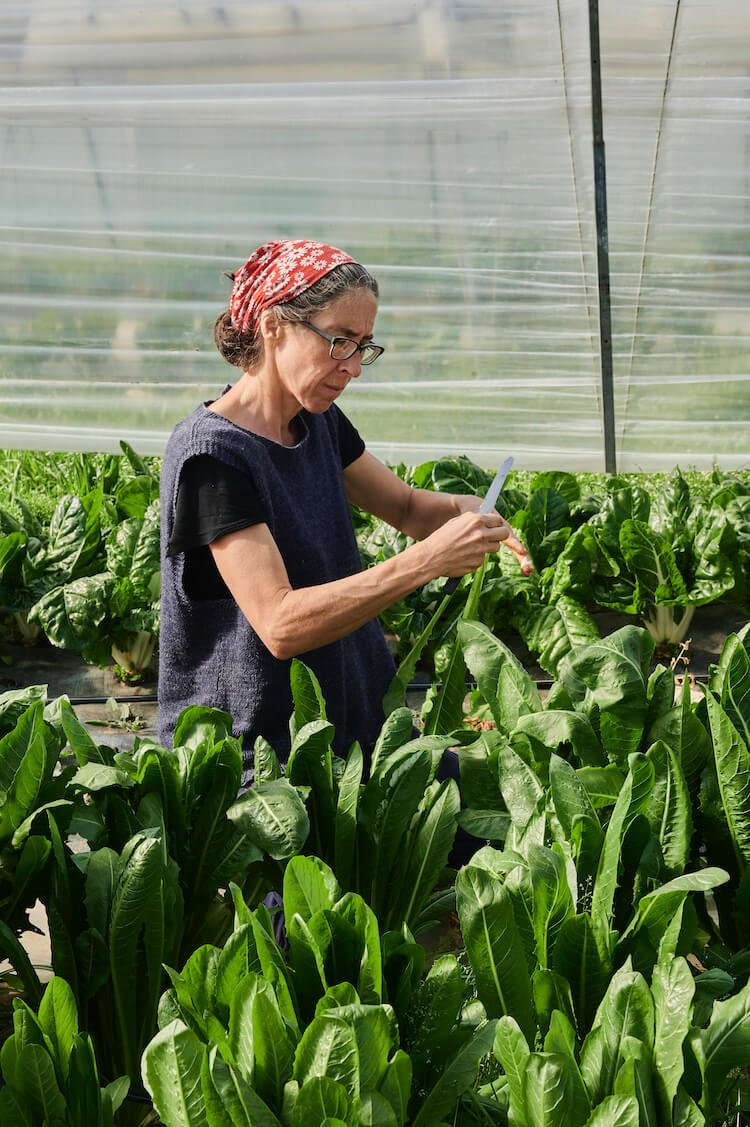
Cecilia, one's of the permanent farmers, in the beet field.
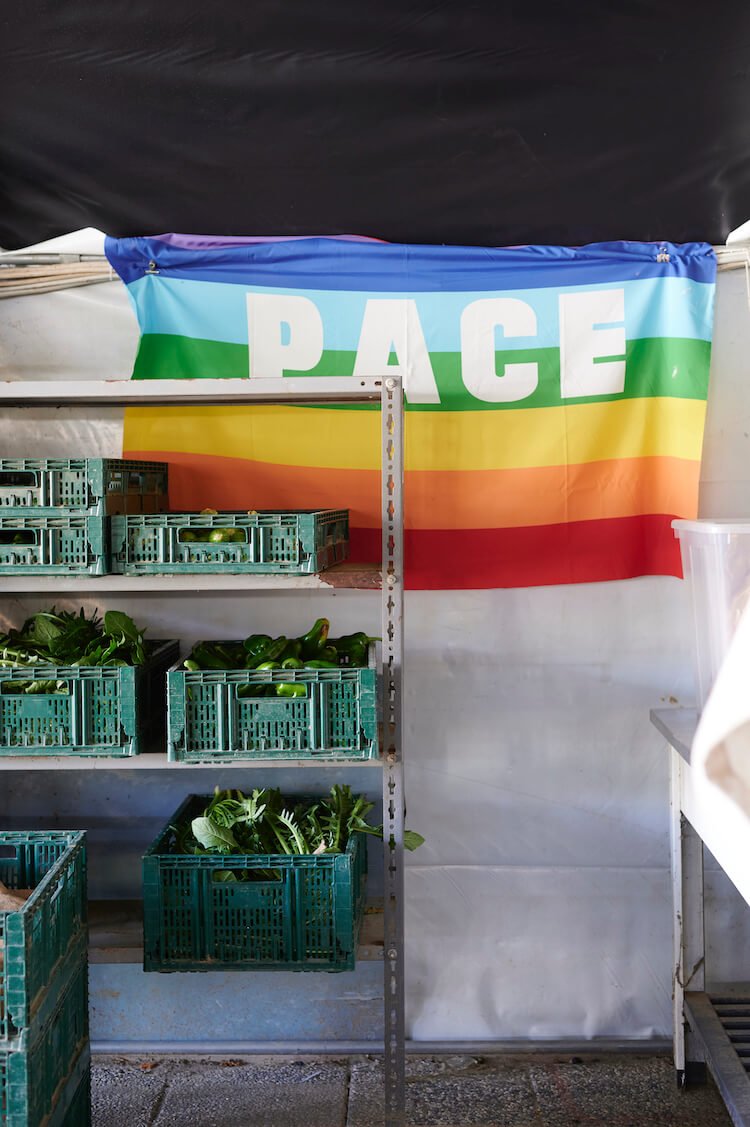
The ever-present Arvaia Peace Flag.

Stefano, farmer at Arvaia, with his grandson during the red spring onions harvest in April.

The cart used to transport crates of vegetables, perfect for passing between greenhouses.

In the Arvaia kitchen, the calendar on which the sowing and harvest dates are noted.
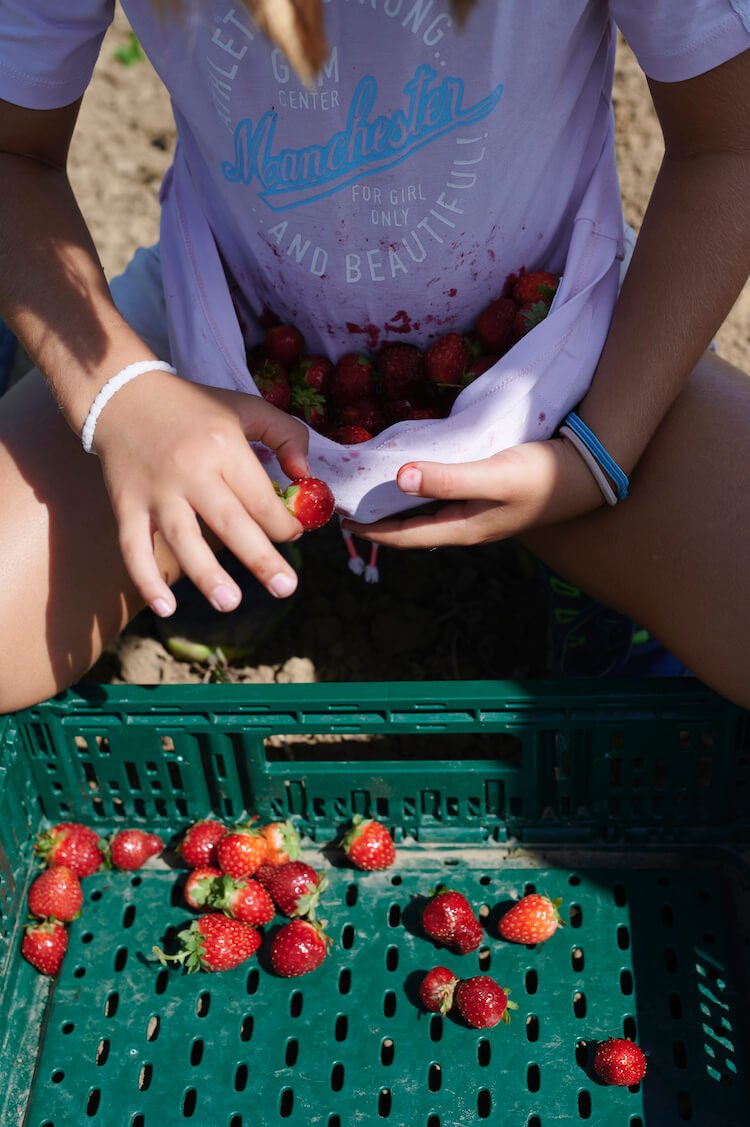
Eva, Stefano's granddaughter, during the children's favorite strawberry harvest in April.
And it was precisely the search for a collective experience that prompted Cecilia to become involved in Arvaia as a farmer since its inception in 2013. Inspired by the experience of the CSA Gartencoop, in Freiburg, she saw the possibility of combining agricultural work with political activism, and of being able to farm within a setting that is also social because a reversal of roles takes place. There are no longer producers and consumers, but only comrades in a common enterprise that offers city people the opportunity to enter into agricultural work.
“I like to offer anyone the opportunity to enjoy working in the field, to be able to work together with their hands. Working in the field is therapeutic: you can be quiet and enjoy the toil, the sun, the cold, the sky; you can talk with others, you meet people of different ages, professions, experiences. One meditates by working with her hands. One takes breaks filled with snacks. One shares the satisfaction of getting to the bottom of a job.”
— Cecilia
But the life of a CSA is not all sunshine and roses. For Paola, working in a system in which there is no vertical hierarchy and in which it is crucial to listen to and respect everyone's opinions certainly has generated internal conflicts. Even Cecilia admits that fatigue is often related to sharing decisions and strategies of an economic enterprise with so many people. It takes time and relationship care that one is not always willing or able to put in. On this level, even more than on the agricultural level, she is convinced that they can still improve so much!
SUMMER
If you had to explain to a child, what a CSA is and why it is important to become a member, what would you say?
“If you join us, you'll eat a lot of good, healthy stuff. You'll meet a lot of nice people. You'll have outdoor spaces to play all year round.”
— Carlo


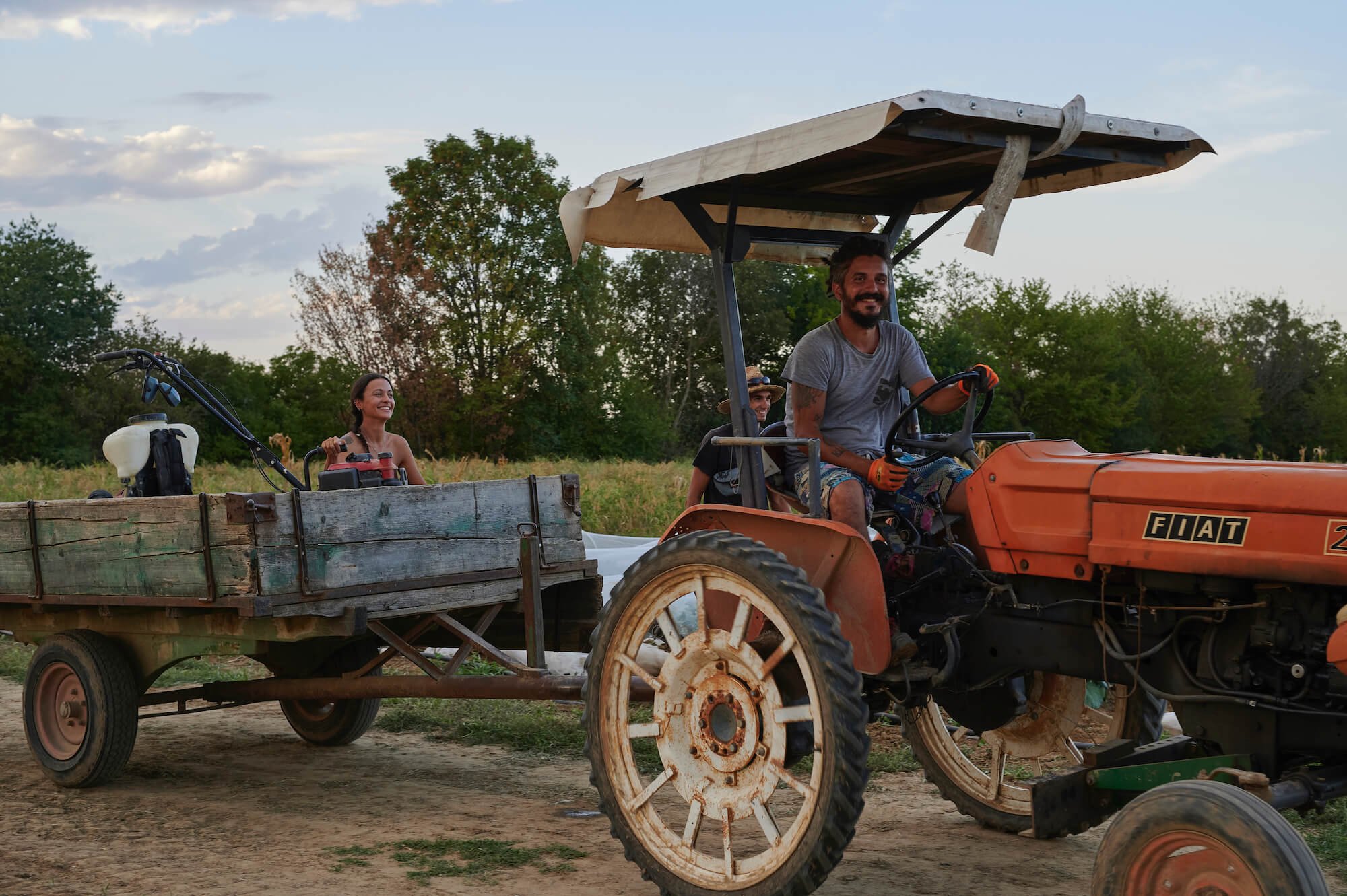
At Arvaia, a wide rotation of many crops are grown, exclusively with organic farming techniques. The soil is fed with compost and green manure (a mixture of grasses and legumes), and many species of plants are grown. Fruit and vegetables are cultivated in open fields and some in unheated greenhouses (covered tunnels), which allow some spring vegetables to harvested early and the harvest of fall and winter vegetables to be extended.
For irrigation a drip system is used to contain and optimize water consumption. Compatible with the geographical location and climate, many varieties of vegetables are grown to offer a healthy and varied diet throughout the year, with attention to the nutritional and gastronomic properties.
In rotation with vegetables and green manure, Arvaia grows autumn cereals such as soft and hard wheat, barley, spelt, rye, oats; and millet as a spring cereal. From the harvest and processing of cereals the farmers obtain grains, flour, bread, rusk, and pasta. Biodiversity and good soil health provide food variety for members and help the plants to cope with insects and pests. The interventions to defend them are kept to an absolute minimum.
What is the most rewarding thing for you?
“To have found a place where I work, devoting a lot of physical and mental energy to it, but I can compare myself with people who have many interests that are similar to mine and I really feel like part of a family, this makes the drudgery go by the wayside. I really enjoy it when we all work together in the same activity and exchange opinions, or just talk nonsense and laugh while struggling.”
— William
AUTUMN
What is your favorite time of the workday?
"The early part of the morning, in summer, when the world slowly awakens and the bees buzz around in search of the daily spoils. The convivial moments, over all the watermelon breaks in the middle of summer."
— Lorenzo
What is your favorite thing to do in the field?
"Hoe weeding, although I feel sorry for the plants and other living things that undergo such activity."
And the one you like the least or the most tiring one?
"Many hours of work on the tractor to to plow in the left-over crops, because there is an air of the end of the dances, end of the party."
— Lorenzo

Initiatives such as Arvaia have opened perspectives throughout Italy, particularly during the pandemic, and the country now counts more than fifteen of them. They allow for the exchange of ideas, seeds, tools and knowledge and are examples of solidarity and collaboration to address the current environmental, social and economic crisis.



